Table of Contents
The UGC NET syllabus for the Comparative Study of Religions is now available on the official UGC website. Aspiring candidates preparing for the UGC NET exam can access the syllabus for the Comparative Study of Religions subject in both Hindi and English as a PDF. The UGC NET Exam will be conducted in online mode.
To assist candidates in their exam preparation, we have provided the comprehensive syllabus for the Comparative Study of Religions subject below.
UGC Comparative Study of Religions Syllabus- Overview
The syllabus of Comparative Study of Religions Subject for the UGC NET Exam Syllabus will be available in this article and candidates can check the detailed topic-wise syllabus here. The UGC National Eligibility Test Comparative Study of Religions exam will be held in 2 papers which have been explained below table :
| UGC NET Comparative Study of Religions Syllabus | |
| Name of the Exam | National Eligibility Test (UGC NET) |
| Conducting Body | National Testing Agency (NTA) |
| Subject | Comparative Study of Religions |
| Mode of Examination | Online |
| Type of Questions | Multiple Choice Questions (MCQs) |
| Number of Papers |
|
| Total Marks | Paper 1 – 100, Paper 2- 200 |
| Number of Questions | Paper 1 – 50, Paper 2- 100 i.e. 150 |
| Time Duration | 3 hours |
| Negative Marking | No |
NET Comparative Study of Religions Syllabus: Important Topics
This article provides an overview of important topics in the Comparative Study of Religions, which will assist candidates preparing for the UGC NET Exam. The Comparative Study of Religions paper covers various subjects, including an Introduction to the Study of Religion, Early Forms of Religious Expression, Modern Trends in Religious Studies, and the Study of Specific Religious Traditions, among others. Here, we highlight key topics that will be beneficial for candidates as they prepare for the exam.
- Religion: Meaning, Definition, Nature, and Scope
- Early forms of Religious Expression: Mana, Magic, Fetishes, Shamans, Totem, Taboo, Ancestor worship.
- Approaches to the Study of Religion: Anthropological, Sociological,
- Phenomenological, Psychological, Historical, and Experiential.
- Nature of Vedic Religion and Culture
- Sramana Culture and Tirthankara Tradition (Rsabhadeva to Mahavira)
- Background, Life and Teaching of Gautama Buddha
- Origin and Development: Creation, the Call of Abraham, the Call of Moses, the Exodus, the Covenant on Mount Sinai
The Life and Message of Jesus Christ - The social, religious condition of Arabia before the advent of Islam
- Socio-religious milieu and life and mission of Guru Nanak
NET Comparative Study of Religions Topic-wise Syllabus for Paper 2
UGC NET Syllabus for Paper 2 will be consisting the subject concerned section i.e. Comparative Study of Religions. UGC National Eligibility Test Comparative Study of Religions Topic-wise Syllabus 2025 will explain the examination nature for candidates in the UGC NET Examination.
Unit I: Study of Religion
- Religion: meaning, definition, nature, and scope
- Theories: origin of religion
- Study of religion: aims and objectives
- Dimensions of religion: doctrinal, social, moral code of conduct, devotional praxis
- Religion’s relationship with other disciplines: theology, ethics, philosophy, sociology, psychology, culture and arts
Unit II: Pre-historical Religious Forms
- Early forms of religious expression: mana, magic, fetishes, shamans, totem, taboo, ancestor worship
- Nature of holy: animism, naturism, theism, polytheism, henotheism, deism, monotheism, pantheism, and panentheism
- Task and objectives: myths, rituals, rites of passage, sacraments, prayers, festivals, sacrifices
- Religion of the major civilizations: Indus Valley, Mesopotamian, Egyptian, Greek, Roman, Chinese
- Meaning and nature: syncretism, mysticism, schism, sect, etc.
- Zoroastrianism: beliefs and practices
Unit III: Modern Trends in the Study of Religion
- Approaches to the study of religion: anthropological, sociological, phenomenological, psychological, historical, and experiential
- Challenges to religion: atheism, agnosticism, existentialism, humanism, Marxism, rationalism, materialism, secularism, relativism, globalization, clash civilizations
- Modern trends in the study of religion: holistic or all-inclusive approach, interfaith understanding and dialogue, co-existence, human rights, empowerment of the subaltern or social justice, gender equality, ecology and environment, world peace and harmony
- University Grants Commission NET Bureau Syllabus
- Religious authority: tradition, magician, diviner, scripture, seer, saint, reformer, founder, prophet
Unit IV: Hinduism
- Nature of Vedic religion and culture
- Vedic literature – Samhita-s, Aranyak-s, Upanisad-s
- Shaivism, Vaishnavism, Shaktism, Tantraism, etc.
- Six systems of Hindu philosophy – Sankhya, Yoga, Nyaya, Vaisheshika, Mimamsa, and Vedanta
- Epics (Ramayana, Mahabharata) and Purana-s
- Bhakti and reform movements of the medieval period
- Modern reform movements (Brahmosamaja, Aryasamaja, Ramakrishna Mission, etc.)
Unit V: Jainism
- Sramana culture and Tirthankara tradition (Rsabhadeva to Mahavira)
- Main sects of Jainism – Digambara and Svethambara
- Prakrit Agama literature and prominent Acaryas
- Basic doctrines, principles, and philosophy
- Contribution to arts and architecture
- Social aspects of Jainism
- Contemporary developments of Jainism
- Jain pilgrimage and Jain festivals
Unit VI: Buddhism
- Background, life and teaching of Gautama Buddha
- Pali Tipitaka literature and Mahayana Sutra-s
- Main sects – Hinayana, Mahayana, etc.
- Basic doctrines, principles, and philosophy
- Contribution to arts and architecture
- Expansion of Buddhism outside India
- Social aspects and revival of Buddhism
Unit VII: Judaism
- Origin and development: creation, the call of Abraham, the call of Moses, the Exodus, the covenant on Mount Sinai
- Hebrew scripture: Pentateuch (Torah), prophets (Nibium), writings (Ketubium)
- Jewish beliefs: Ten Commandments, Talmud, Midrash, Passover, Messiah, etc.
- Jewish celebration: Sabbath, synagogue assembly, Passover, Feast of Weeks, Feast of Tabernacles
- Jewish ethics: covenant consciousness, Mosaic Laws, Jubilee stipulations, marriage and family
- Importance of Jerusalem
- Major denomination of Judaism
Unit VIII: Christianity
- The life and message of Jesus Christ
- The beginning of Christianity and the Sermon on the Mount
- Old Testament and New Testament scriptures
- Main Christian churches (Catholic, Orthodox, and Protestant)
- Important beliefs and teachings of Christianity
- Christian life: worship, rituals, and mysticism
- History of Christianity in India
- Contemporary trends in Christian theology
Unit IX: Islam
- The social, religious condition of Arabia before the advent of Islam
- Life of the Prophet Mohammad and the basic teachings of the Quran, the establishment of the Islamic community and the Madina state
- Introduction of Hadith and Fiqh and some important Muhaddith (Imam Bukhari, Imam Muslim) and Faqi (Imam Abu Hanifa, Imam Shafi, Imam Malki Imam Hanbal)
- Some important Muslim thinkers: Ali ibn e Hazam, Abu Hamid al-Ghazali, ibn-eTaimiyah and Shah Waliullah
Development of Sufism, some important Sufi order’s (Chishtiyah, Qadriayah, Suharwardiyah, Naqsbandiyah, and their impact on society - Challenges of modernity and the reform movements among Muslim in India
- Origin and development of sects: ithna Ashari, Mutazilites and Asharits
- The contribution of Medieval Islam to Rational sciences, philosophy and fine arts
Unit X: Sikhism
- Socio-religious milieu and life and mission of Guru Nanak
- Development of the Sikh Panth (1539-1708)
- The Sikh scripture (Sri Guru Granth Sahib) and the Sikh literature
- The Sikh beliefs and the code of conduct
- The Sikh institutions, ceremonies and festivals
- The Sikh sects and modern socio-religious movements
- The Sikh diaspora and modern issues
UGC Comparative Study of Religions Syllabus PDF in Hindi and English
The direct link to download the UGC National Eligibility Test Comparative Study of Religions Syllabus PDF in Hindi and English has been given below. Candidates can download the Syllabus for Comparative Study of Religions for UGC NET in both languages. The link to download the NET Comparative Study of Religions Syllabus PDF has been given below:
| Download NET Comparative Study of Religions Syllabus PDF in Hindi and English | |
| Language | Download PDF |
| English | Download PDF |
| Hindi | Download PDF |
NTA NET Comparative Study of Religions Preparation Tips
Here are some of the preparation tips for the candidates preparing for the UGC NET Exam with the Comparative Study of Religions subject. The candidates will be beneficial by reading the following tips while preparing their study routine and execution phase as well.
- Many candidates tend to neglect their weaker topics out of fear of not mastering them. It’s crucial to address these areas by practicing quizzes daily.
- Evaluate your preparation – Candidates should assess their progress by taking mock tests or using question banks.
Utilize online classes and available study materials. - Engage in daily practice with quizzes and mock tests. Regularly attempt subject-wise quizzes and mock tests available on the Adda247 store.
- Follow a structured study plan with a subject-specific strategy.
- Avoid overloading yourself. Take short breaks during your study sessions.
- Utilize diagrams and charts to aid in understanding complex concepts.
- Since there is no negative marking or sectional cutoff in the NTA NET examination, focus on maximizing your score by improving accuracy and speed.

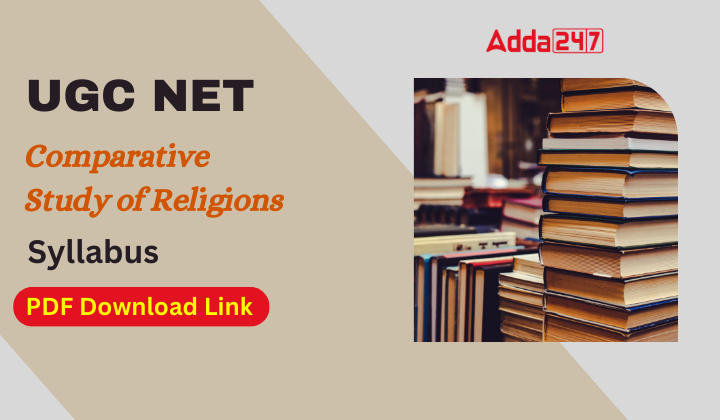
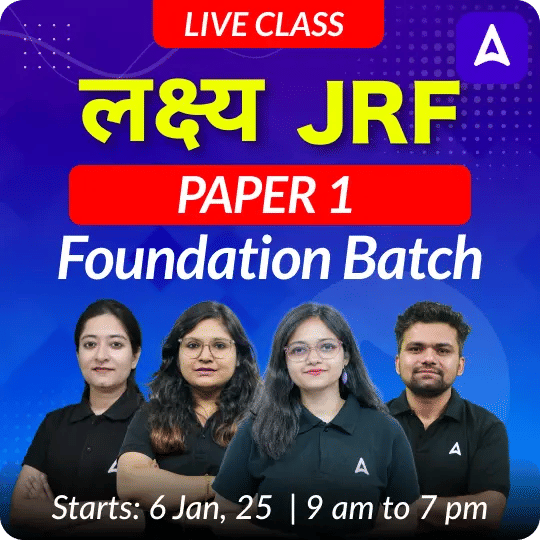

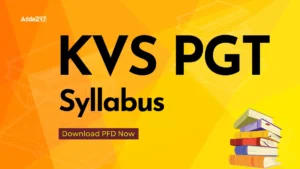 KVS PGT Syllabus 2025, Download PGT Syll...
KVS PGT Syllabus 2025, Download PGT Syll...
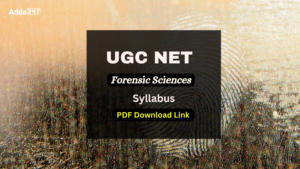 UGC NET Forensic Science Syllabus 2025 a...
UGC NET Forensic Science Syllabus 2025 a...
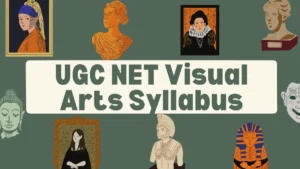 UGC NET Visual Arts Syllabus 2025 PDF Do...
UGC NET Visual Arts Syllabus 2025 PDF Do...














